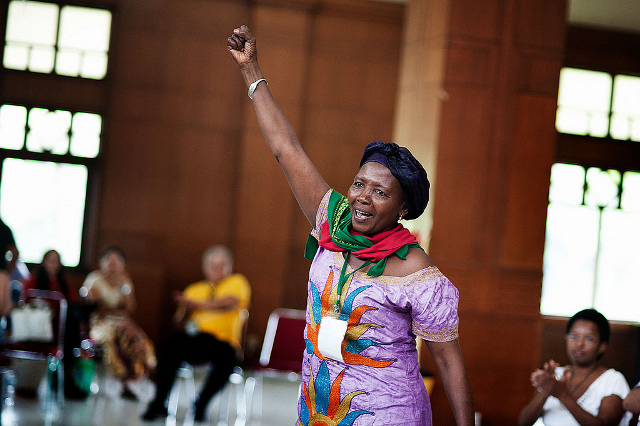International Women’s Day : We struggle against capitalism, patriarchy and for our rights!

Press release of La Via Campesina for the 8TH March 2014
 (Harare, March 7, 2014) Tomorrow, the 8th of March, International Women’s Day, La Via Campesina reaffirms its anti-capitalistic and anti-patriarchal stance. We express our firm decision to fight and to take the streets and protest for a new vision of the world, based on the principles of respect, equality, justice, solidarity, peace and freedom. We are committed to continuing the struggle together with the working women of the rural and urban areas.
(Harare, March 7, 2014) Tomorrow, the 8th of March, International Women’s Day, La Via Campesina reaffirms its anti-capitalistic and anti-patriarchal stance. We express our firm decision to fight and to take the streets and protest for a new vision of the world, based on the principles of respect, equality, justice, solidarity, peace and freedom. We are committed to continuing the struggle together with the working women of the rural and urban areas.
The first celebration of International Working Women’s Day (now International Women’s Day) took place on the 19th March 1911 in Germany, Austria, Denmark and Switzerland, with rallies in which women demanded the right to vote, the right to hold public office, the right to work and an end to gender discrimination.
Just a few days later, on the 25th March, more than 140 female workers, mostly immigrants, died in a fire in a textiles factory in New York. This disaster had an enormous effect on labour legislation in the United States, and also on subsequent International Women’s Day celebrations, which made reference to the working conditions that led to this tragic incident.
From then until now, women are undeniably still fighting to claim our rights. Today’s society, capitalist and patriarchal, sustained by difference and the exploitation not just of natural resources and of the earth, but also of the human race itself, builds its wealth and development on an inequality which thus becomes necessary.
In this context, women from rural areas, female labourers, female peasants and indigenous women, we find ourselves placed in an even lower class due to the simple fact that we are female. Doubly exploited. Doubly oppressed.
Violence towards women, may it be sexual, physical or psychological, is widespread in our societies. A recent survey in Europe showed that 1/3 of women have encountered gender-based violence. Current cuts in social security which affect women more than men and regressive reproductive law changess are an expression of the violence shown towards women.
We women are struggling hard to change our societies and to demand reparation and the abolition of all sexist practices. One example is the struggle in Asia for reparation and recognition of the crimes committed by the Japanese army in WWII, when women were systematically forced to work as sex slaves. Still now, organised rape is happening in conflict zones and is one of the most horrible expressions of violence towards women.
As La Via Campesina we will strengthen our campaign to STOP violence towards women.
Our struggle and action for Food Sovereignty has given us women the opportunity to make visible our historical participation in the development of the world’s food systems and the role we have played since the invention of agriculture. This role has consisted of the collection and propagation of seeds and in the protection and preservation of biodiversity and genetic resources, and places us as primary emotional and ethical pillars of society.
Women farmers and farmworkers, indigenous women and women from rural areas, we will keep on struggling for the defence of nature, Mother Earth, food and Food Sovereignty. We will defend them against exploitation and violence at all levels and of all expressions, against the TNCs and against an exploitative and self-destructive system.
Women and men of La Via Campesina demand the creation of spaces of debate and exchange, where valid tools for a diverse and plural society can be developed: tools to create awareness in the communities on the political and cultural visions that block progress in gender equality.
The organized peasant women are convinced that there is no possibility of regression in the progress and triumphs achieved, and even less so in the minds of women. We continue to fight for the “sovereignty of the land, the territory and the body” saying no to violence against women in all its forms.
We demand equality in rights, respect of cultural, gender and ethnic diversity, social justice for all living beings, and the inalienable right to live in dignity.
We commit to deepen and expand our process of collective construction of a political proposal to construct the bases for “Popular Peasant Feminism”.
GLOBALISE STRUGGLE, GLOBALISE HOPE
LINKS to :
